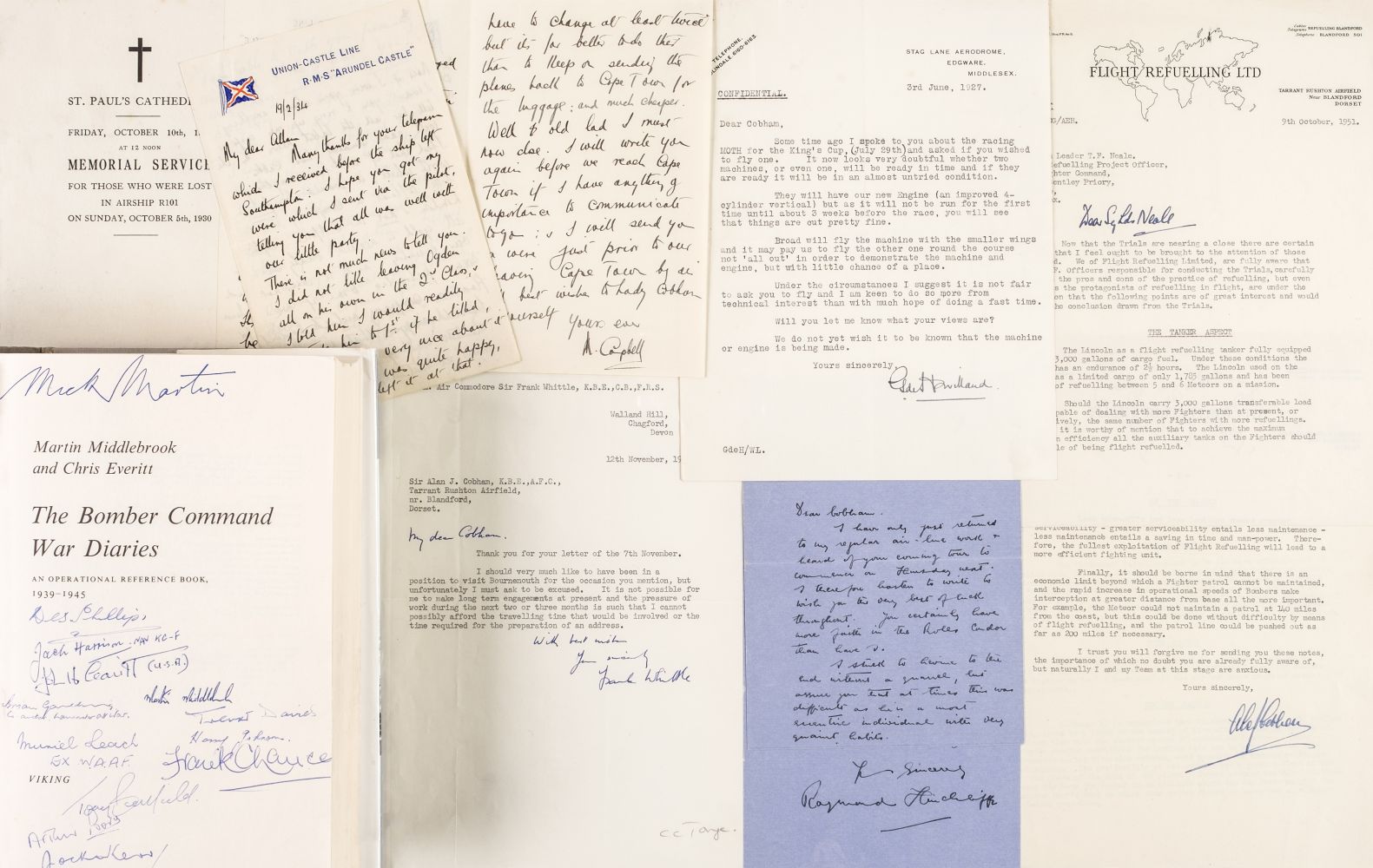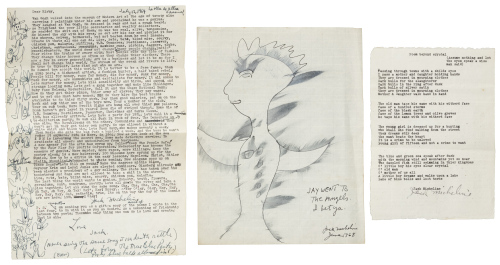Title: Archive of approximately 90 handwritten letters from John W. Grosh, a soldier in the Union Army, and from and between other family members during the Civil War, with many envelopes and some related items Author: Grosh, John W., et al. Place: Various places Publisher: Date: c.1858-1868 Description: The letters are neatly housed in plastic sleeves in a three-ring binder, in chronological order, some with their envelopes, with a number of separate envelopes at the end. In addition, each of the letters has been scanned, and a typed transcript made – these are filed together in a plastic spiral binding, and there is a separate three-ring binder of the transcripts as well. Finally, there is available a flash drive containing the scans of the letters and transcriptions. An important archive rich in detail, revealing the activities of camp life and battles, the familial bonds of the participants, and the toll of war. The letters begin a few years before the Civil War, and end a few years after, but most are from the heart of the war, and revolve around the service of John W. Grosh, a Pennsylvanian who enlisted in the Union Army in 1861, and served until his death in November of 1863 while a prisoner of the Confederates. In the odd circumstances of war, his death had been prematurely reported to his family before a short-lived resurrection, with the final, true report of his demise not made to his family until July 19th, 1864, more than six months after his death. Besides John W. Grosh, the correspondents include his mother Sarah, his younger brother Jacob, his sister Fanny, cousin Mary, and a few others. The letters have descended in the family until the present time. On October 6th, in the early days of his service, excitement and anticipation reign while drilling at Camp Hambright, near Harrisburg, PA: “Dear Sister… I was pleased with the way the tents are put up, everything appears firm and strong, and around the edge there is a small trench dug to lead off the water in wet weather… The boys are all in good spirits and highly pleased with camp life…” They soon move south to Kentucky, and a few month later life is not so rosy, as in a Jan. 18th, 1862 letter to Fanny, “This is a miserable, rainy day. Everywhere you go, as far as you can see, there is nothing but mud. It is ankle deep – knee deep – any depth at all… A leaky tent is the only retreat we have to escape the mud… If we don’t soon get away, or get dry weather, our division will drown in the mud…” The next months are spent at camps in Kentucky and Tennessee, with much detail on barracks life, the drudgery and disease, the food, vermin, and other afflictions, the money used by the troops, excursions into towns, with occasional action, and a few false alarms, as on May 2nd, 1862, in a letter from John to his brother Jacob, “…my comrade and I had just laid down for a nap when Capt. Green came and told us to be ‘ready for anything’. The drums beat the long roll and the cavalry came dashing down the pike at a neck-breaking speed, with their swords rattling and clashing and the whole camp was under arms… After a while it was reported that General Mitchel’s army was cut up by the rebels, but that big story dwindled down to smaller dimensions and this morning we had a more credible one, stating that a number of rebel Guerillos or scouting party fell upon and destroyed or captured one of Gen Mitchel’s provisional trains…” Sometimes, however, the alarms were not false, as related in a letter from John to his mother on Oct. 14, 1862, from Boyle Co., Kentucky, “…I suppose you have heard all about the great battle of ‘Chaplin Heights,’ and I need not therefore attempt a description. Well, I was in it and came out safe again, but 24 of our company were not so fortunate. One was killed on the spot and the rest wounded… We fought about 3 hours, the bullets whizzing past our ears faster than we could count them. We suffered much for want of water there was not a
Title: Archive of approximately 90 handwritten letters from John W. Grosh, a soldier in the Union Army, and from and between other family members during the Civil War, with many envelopes and some related items Author: Grosh, John W., et al. Place: Various places Publisher: Date: c.1858-1868 Description: The letters are neatly housed in plastic sleeves in a three-ring binder, in chronological order, some with their envelopes, with a number of separate envelopes at the end. In addition, each of the letters has been scanned, and a typed transcript made – these are filed together in a plastic spiral binding, and there is a separate three-ring binder of the transcripts as well. Finally, there is available a flash drive containing the scans of the letters and transcriptions. An important archive rich in detail, revealing the activities of camp life and battles, the familial bonds of the participants, and the toll of war. The letters begin a few years before the Civil War, and end a few years after, but most are from the heart of the war, and revolve around the service of John W. Grosh, a Pennsylvanian who enlisted in the Union Army in 1861, and served until his death in November of 1863 while a prisoner of the Confederates. In the odd circumstances of war, his death had been prematurely reported to his family before a short-lived resurrection, with the final, true report of his demise not made to his family until July 19th, 1864, more than six months after his death. Besides John W. Grosh, the correspondents include his mother Sarah, his younger brother Jacob, his sister Fanny, cousin Mary, and a few others. The letters have descended in the family until the present time. On October 6th, in the early days of his service, excitement and anticipation reign while drilling at Camp Hambright, near Harrisburg, PA: “Dear Sister… I was pleased with the way the tents are put up, everything appears firm and strong, and around the edge there is a small trench dug to lead off the water in wet weather… The boys are all in good spirits and highly pleased with camp life…” They soon move south to Kentucky, and a few month later life is not so rosy, as in a Jan. 18th, 1862 letter to Fanny, “This is a miserable, rainy day. Everywhere you go, as far as you can see, there is nothing but mud. It is ankle deep – knee deep – any depth at all… A leaky tent is the only retreat we have to escape the mud… If we don’t soon get away, or get dry weather, our division will drown in the mud…” The next months are spent at camps in Kentucky and Tennessee, with much detail on barracks life, the drudgery and disease, the food, vermin, and other afflictions, the money used by the troops, excursions into towns, with occasional action, and a few false alarms, as on May 2nd, 1862, in a letter from John to his brother Jacob, “…my comrade and I had just laid down for a nap when Capt. Green came and told us to be ‘ready for anything’. The drums beat the long roll and the cavalry came dashing down the pike at a neck-breaking speed, with their swords rattling and clashing and the whole camp was under arms… After a while it was reported that General Mitchel’s army was cut up by the rebels, but that big story dwindled down to smaller dimensions and this morning we had a more credible one, stating that a number of rebel Guerillos or scouting party fell upon and destroyed or captured one of Gen Mitchel’s provisional trains…” Sometimes, however, the alarms were not false, as related in a letter from John to his mother on Oct. 14, 1862, from Boyle Co., Kentucky, “…I suppose you have heard all about the great battle of ‘Chaplin Heights,’ and I need not therefore attempt a description. Well, I was in it and came out safe again, but 24 of our company were not so fortunate. One was killed on the spot and the rest wounded… We fought about 3 hours, the bullets whizzing past our ears faster than we could count them. We suffered much for want of water there was not a















Testen Sie LotSearch und seine Premium-Features 7 Tage - ohne Kosten!
Lassen Sie sich automatisch über neue Objekte in kommenden Auktionen benachrichtigen.
Suchauftrag anlegen